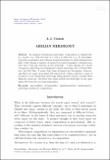Files in this item
Abelian mereology
Item metadata
| dc.contributor.author | Cotnoir, Aaron | |
| dc.date.accessioned | 2015-03-09T17:01:01Z | |
| dc.date.available | 2015-03-09T17:01:01Z | |
| dc.date.issued | 2015 | |
| dc.identifier | 166207443 | |
| dc.identifier | 010d301c-ea0c-4e5c-bf3c-1b5d23a2d737 | |
| dc.identifier | 84962124374 | |
| dc.identifier | 000410166600002 | |
| dc.identifier.citation | Cotnoir , A 2015 , ' Abelian mereology ' , Logic and Logical Philosophy . https://doi.org/10.12775/LLP.2015.006 | en |
| dc.identifier.issn | 1425-3305 | |
| dc.identifier.other | ORCID: /0000-0003-4528-7570/work/65702605 | |
| dc.identifier.uri | https://hdl.handle.net/10023/6197 | |
| dc.description | Date of Acceptance: 01/12/2015 | en |
| dc.description.abstract | In classical extensional mereology, composition is idempotent: if x is part of y, then the sum of x and y is identical to y. In this paper, I provide a systematic and coherent formal mereology for which idempotence fails. I first discuss a number of purported counterexamples to idempotence that have been put forward in the literature. I then discuss two recent attempts at sketching non-idempotent formal mereology due to Karen Bennett and Kit Fine. I argue that these attempts are incomplete, however, and there are many open issues left unresolved. I then construct a class of models of a non-idempotent mereology using multiset theory, consider their algebraic structure, and show how these models can shed light on the open issues left from the previous approaches. | |
| dc.format.extent | 182940 | |
| dc.language.iso | eng | |
| dc.relation.ispartof | Logic and Logical Philosophy | en |
| dc.subject | Universalism | en |
| dc.subject | Extensionality | en |
| dc.subject | Supplementation | en |
| dc.subject | Antisymmetry | en |
| dc.subject | Mereology | en |
| dc.subject | Parthood | en |
| dc.subject | Composition | en |
| dc.subject | B Philosophy (General) | en |
| dc.subject.lcc | B1 | en |
| dc.title | Abelian mereology | en |
| dc.type | Journal article | en |
| dc.contributor.institution | University of St Andrews. Philosophy | en |
| dc.identifier.doi | https://doi.org/10.12775/LLP.2015.006 | |
| dc.description.status | Peer reviewed | en |
This item appears in the following Collection(s)
Items in the St Andrews Research Repository are protected by copyright, with all rights reserved, unless otherwise indicated.

